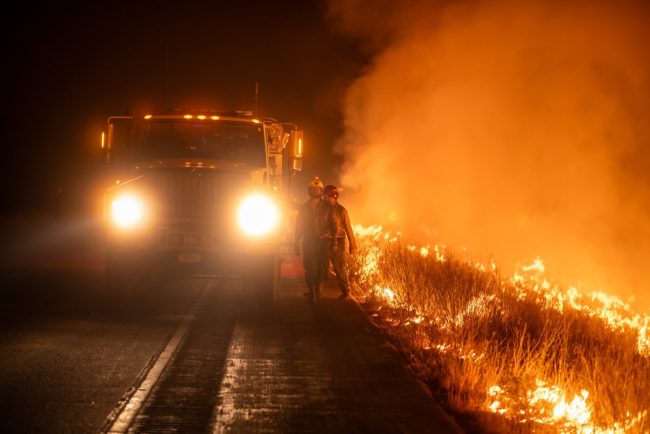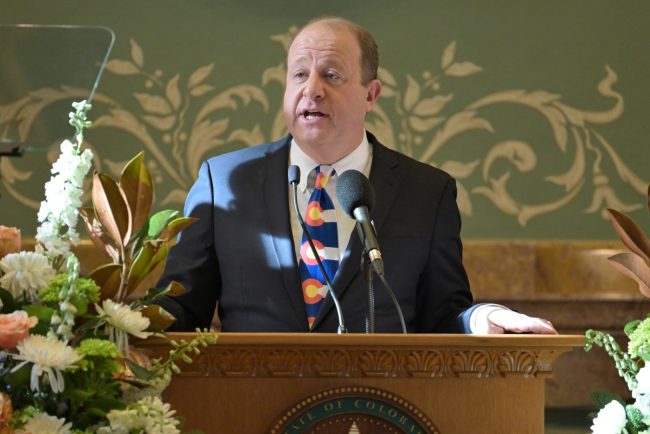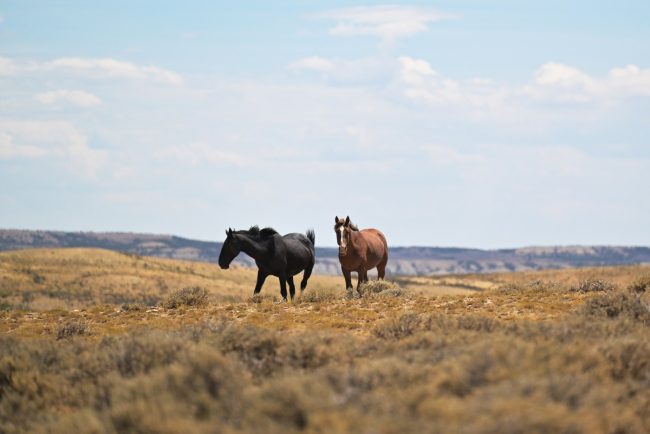
Sandwich thrower may be “not guilty” but behavior toward police is unacceptable (Letters)
Protester throwing a sandwich is inexcusable Re: “Man who threw sandwich at agent found not guilty,” Nov. 7 news story Although I can understand and appreciate the frustration the sandwich thrower felt, there is no justification for throwing any object at the police. As a […]
Letters
Weiser is wrong to jump ship on Colorado’s fair redistricting process (Opinion)
Dear Attorney General Phil Weiser, it’s not “Do unto others as they did unto you;” it’s “Do unto others as you would have them do unto you.” Weiser wants Colorado to ditch the independent redistricting commission 71% of voters endorsed in 2018 and return to […]
Columnists
Trump is setting up our National Parks for failure — to be sold or taken over by private interests (Opinion)
For over a month, the longest government shutdown in American history has left our national parks in free fall. When the shutdown began in October, the Interior Department sent over 9,000 Park Service staff home without pay, with orders to leave most parks open with […]
Columnists


Trump’s whipsawing performances with Putin and Zelenskyy reminded me why I’m a proud neocon (Opinion)
Although the term “neoconservative” has fallen into disuse — except as an occasional slur used by the MAGA right, the progressive left and social-media antisemites who really mean to say “Jew” — I’ve never been shy about describing myself as one. In Donald Trump’s whipsawing […]
ColumnistsAlthough the term “neoconservative” has fallen into disuse — except as an occasional slur used by the MAGA right, the progressive left and social-media antisemites who really mean to say “Jew” — I’ve never been shy about describing myself as one. In Donald Trump’s whipsawing performances with Vladimir Putin in Alaska on Friday and Volodymyr Zelenskyy and his European allies in Washington on Monday, I’m reminded of why.
Neoconservatism emerged in the early 1970s as a loosely coherent movement of disenchanted liberals who were critical of the welfare state and turned off by the anti-Americanism of parts of the anti-war left. But the movement also took a dim view of the Nixon administration, particularly in its pursuit of arms control with the Soviet Union, its relative indifference to human rights issues behind the Iron Curtain, and its realpolitik approach to foreign policy in general.
I learned this the hard way 14 years ago, when Henry Kissinger nearly kicked me out of his Park Avenue office for having the ill grace to ask him about China’s brutal treatment of Liu Xiaobo, the imprisoned dissident. The former secretary of state, then 88, was still too concerned with currying influence in Beijing to say anything nice about his fellow Nobel Peace laureate.
Little wonder, then, that many of Trump’s most ardent conservative opponents in recent years are, or were, old-school neocons. Like President Richard Nixon’s, Trump’s politics are a mix of statist economic impulses, populist grievances, the conceit of being above the law and a transactional approach to foreign policy that discounts the moral force of American ideals. What Trump lacks in his predecessor’s intellectual sophistication, he makes up for with his gifts for crude showmanship.
What would a traditional neocon say about Trump’s latest diplomatic efforts between Russia and Ukraine? A few points.
First, we’d note that dictators who are contemptuous of the rights of their own people tend to be equally contemptuous of the rights of other countries. That’s why some of us were ringing alarms about the global threat from Putin when many liberals still thought he was negotiable. By retreating from his threat to sanction Russia if it didn’t agree to a ceasefire, Trump has simply ratified Putin’s strategy of contempt.
Second, dictators who do not abide by the rule of law at home will not honor international agreements, either. The Soviet Union violated virtually every arms control agreement it signed. Putin’s Russia has followed suit with violations of the 1987 Intermediate-Range Nuclear Forces Treaty, the 1994 Budapest memorandum supposedly guaranteeing Ukraine’s territorial integrity, and the Minsk agreements that were supposed to end the fighting between Ukraine and Russia in 2015. Whatever deal Putin may yet sign will simply be another paper promise he’ll inevitably break.
Third, Putin does not see Trump’s chummy manner, his effort to forge personal ties, as an invitation to be reasonable. He sees it as vanity and therefore weakness: The perennial hankering of Western politicians for a deal, a win, a Nobel Prize. Even worse is Trump’s constant blaming of Joe Biden for the war, which would make the United States responsible for the war Putin started — exactly the anti-American narrative Putin wishes to advance.
Fourth, neocons subscribe to a “broken windows” theory of international order: If disorder goes unchecked, or if aggression is rewarded, in one part of the world, it will encourage disorder and aggression in other parts. Some in this administration, particularly the Pentagon’s Elbridge Colby, seem to think that settling the war in Ukraine will allow the United States to concentrate its efforts on containing China. In fact, nothing will do more to encourage Chinese adventurism against Taiwan or in the South China Sea than to see Putin rewarded in Ukraine.
Fifth, neocons believe that American ideals do not undermine American power; rather, they march hand in hand. When the United States lent destroyers to the United Kingdom in 1940, we created the conditions that allowed us to prevail in World War II. When we stood up for West Berlin in the face of Soviet threats, we secured an oasis of freedom that would eventually lead to the fall of the Berlin Wall and the end of the Soviet Union. By putting the interests of what Trump calls “peace” ahead of the interests of freedom, we are all but guaranteeing that Ukraine will lose both.
Sixth, international guarantees are mostly worthless unless backed by credible and overwhelming power. If Putin has reason to doubt America’s commitment to Ukraine’s independence — and Trump has done nothing but give him reasons — he or his successors will seek ways to violate it.
Seventh, the only way to guarantee an end to this conflict is steadfast opposition to Putin through sanctions, ostracism, and military and economic support for Ukraine and every other country Russia threatens. Trump aims to do the opposite.
Neocons may have long ago fallen out of fashion. To watch Trump in recent days is to be reminded that some old fashions deserve to be made new again.
Bret Stephens is an Opinion columnist for The Times, writing about foreign policy, domestic politics and cultural issues.
Sign up for Sound Off to get a weekly roundup of our columns, editorials and more.
To send a letter to the editor about this article, submit online or check out our guidelines for how to submit by email or mail.

Opponents to a small nuclear reactor at DIA are as foolhardy as climate deniers (Opinion)
Fear mongering stopped leaders from considering carbon-free power innovation this week. Rightwing climate deniers strike again? Nope. Agitation from the left prompted Mayor Mike Johnston and Denver International Airport CEO Phil Washington to shelve a plan to study building a small modular nuclear reactor to […]
ColumnistsFear mongering stopped leaders from considering carbon-free power innovation this week. Rightwing climate deniers strike again? Nope.
Agitation from the left prompted Mayor Mike Johnston and Denver International Airport CEO Phil Washington to shelve a plan to study building a small modular nuclear reactor to meet the airport’s growing energy needs while reducing carbon emissions.
These city leaders foresee a time when 120 million passengers will pass through the airport’s gates each year and the air hub will need more reliable power. Keeping the lights on in the control tower isn’t optional. The study should proceed. Fear should not stop leaders from simply knowing more which is what a feasibility study provides.
SMRs (small modular nuclear reactors), which represent the newest breakthrough in nuclear technology, are worth considering. They are smaller and less expensive than traditional reactors and can be prefabricated, transported, and assembled on-site. As with the 54 traditional nuclear power plants around the country, SMRs produce reliable, safe, carbon-free energy. Unlike wind and solar power, which also do not emit carbon dioxide, nuclear reactors produce power continuously regardless of time of day or weather conditions.
Would I live next to a nuclear reactor? Of course. Men and women spend years 500 feet away from a nuclear reactor without ill effect and these submariners aren’t the only ones. More than 120 million Americans live within 50 miles of a nuclear power plant.
When Colorado closes the last of its coal plants in 2031, additional clean energy sources capable of supplying baseload power will need to be in place. Wind and solar, even with battery storage, will not be sufficient. Nuclear power and natural gas are the two options. Right now, nearly a third of the state’s power is supplied by natural gas. This fossil fuel emits less greenhouse gas than coal or petroleum but it will not ultimately enable the state to reach its goal of achieving 100% clean energy.
Earlier this year, the Colorado General Assembly passed legislation to add nuclear power to the list of clean energy sources utilities can use to meet state carbon reduction goals, a sign that a bipartisan consensus has emerged supporting nuclear technology.
They are not alone. Political leaders of both parties and private industry are looking to nuclear power to support the growing energy demands required by artificial intelligence and cloud storage data centers, and the installation of heat pumps and EV chargers. Bill Gates and Warren Buffett are building an SMR in Kemmerer, Wyoming, and Amazon and Google are working with other states and power companies to build SMRs to support their centers. Our neighbor to the west, Utah, just signed an agreement with companies to create a “nuclear energy ecosystem” that combines domestic manufacturing, training, and the building of SMRs.
DEN could join these innovators. The third busiest airport in the country and sixth busiest in the world, DEN broke a record last year with 82.3 million air travelers. Over the next 10 years, the number of passengers will likely increase 15% and with them, the need for more power generation. The airport has already demonstrated support for clean energy by installing solar panels and efficiency measures.
A feasibility study, which will likely cost $1.25 million and take up to a year to complete, will determine how SMR technology can help DEN meet its long-term power needs, assess models and relevant regulations, calculate costs and risks, and elicit community feedback. Johnston and Washington’s willingness to study the technology shows they understand what it will take to keep the lights on when people are up in the air. Fear and NIMBism should not stop them from learning more.
Krista Kafer is a Sunday Denver Post columnist.
Sign up for Sound Off to get a weekly roundup of our columns, editorials and more.
To send a letter to the editor about this article, submit online or check out our guidelines for how to submit by email or mail.

After all their work, The Salvation Army deserves better from Denver City Council (Opinion)
The Salvation Army has been a steadfast partner to the City and County of Denver for years, dedicating its human and financial resources to supporting the city’s efforts to address homelessness. When The Salvation Army announced it would conclude its operation of the city’s three […]
ColumnistsThe Salvation Army has been a steadfast partner to the City and County of Denver for years, dedicating its human and financial resources to supporting the city’s efforts to address homelessness. When The Salvation Army announced it would conclude its operation of the city’s three hotel shelters after fulfilling its contracts through December 2025, the city responded not with gratitude, but with insinuation that The Army was no longer welcome in this space.
As leaders of The Salvation Army Denver Metro Advisory Board, we find this response disingenuous and deeply disappointing. Few agencies have stepped forward in recent years to partner with the city on sheltering our unhoused neighbors. Perhaps they’ve seen how current partners — those who’ve carried the weight of this work — have been treated.
Time and again, when isolated incidents occurred at these shelters, the city stepped back and allowed The Salvation Army to shoulder the blame. Meanwhile, criticisms about the buildings themselves — heat, cold, pests, broken appliances, safety concerns — rest squarely on the city, which owns the facilities. The Salvation Army operates the programs and provides pathways to stable housing.
Let the numbers speak. Across the three hotel shelters, The Salvation Army has housed up to 1,800 people nightly and helped 1,994 individuals transition into stable housing — 52% of those served, compared to a national average of 30%.
Every guest receives case management and wrap-around services. This is the city’s strategy, executed by The Salvation Army with excellence.
And yet, The Salvation Army has its own proven programs — like the Harbor Light Center, where 86% of graduates maintain sobriety and stability. These programs save lives. Is it any wonder the organization wants to refocus on its core mission?
The toll of this partnership has been immense. Since 2020, The Salvation Army has been central to the city’s emergency sheltering efforts, including operating eight shelters and leading the response at the Denver Coliseum during the pandemic. Former Mayor Michael B. Hancock publicly praised The Salvation Army’s role. Without their support, the pandemic’s impact on our unhoused neighbors would have been far worse.
Five years of relentless service has taken its toll. The work is exhausting. The operational challenges are constant. The Salvation Army has done more than any other agency in Denver.
Financially, the burden of covering costs up front has been staggering. The contracts were rolled out so quickly by the city in 2023, in an unprecedented scale of operation, that the organization was not able to anticipate all the costs that such an operation would entail.
In 2024 alone, The Salvation Army spent over $5.2 million, which will be slowly reimbursed, operating the three hotel shelters. In 2025, it went six months without reimbursement from the city, struggling to make payroll for three consecutive months. This is not sustainable.
We serve on The Salvation Army’s Advisory Board because we believe in its mission to meet human need in Jesus’ name without discrimination. We’ve seen its heart, its integrity, and its impact. The city should be thanking The Salvation Army — not casting doubt on its commitment.
Let’s be clear: on August 11, when HOST leadership learned The Salvation Army would not renew its shelter contracts, they pleaded for the organization to continue operating all three shelters beyond December 31. That speaks volumes.
The Salvation Army is, quite simply, Doing The Most Good. It’s time the city acknowledged that — with respect, gratitude, and grace.
Elbra Wedgeworth was a Denver City Councilwoman from 1999-2007 who served two years as Council president. Debbie Ortega was on the City Council from 1987-2003 and from 2011-2023, who served two years as Council president. Liz Stillwell is a businesswoman. Larry Burgess is a business owner. All four are members of the Salvation Army Advisory Board — Intermountain Division.
Sign up for Sound Off to get a weekly roundup of our columns, editorials and more.
To send a letter to the editor about this article, submit online or check out our guidelines for how to submit by email or mail.

The West is on fire as Washington fans the flames (Opinion)
This summer, millions of Americans are hiking, camping, fishing, and making lifelong memories in our national parks, forests and other public lands. But something troubling is taking place behind the beautiful views: The federal agencies that safeguard these places for us are being hollowed out. […]
ColumnistsThis summer, millions of Americans are hiking, camping, fishing, and making lifelong memories in our national parks, forests and other public lands. But something troubling is taking place behind the beautiful views: The federal agencies that safeguard these places for us are being hollowed out.
Staffing and budget cuts at the Bureau of Land Management, National Park Service, U.S. Fish and Wildlife Service and U.S. Forest Service aren’t just numbers on a spreadsheet. They are empty ranger stations during peak season, trail crews that never arrive, and wildfire teams stretched so thin they can’t keep up.
During the four years when I led the BLM, from 2021 to 2025, I saw what it takes to care for hundreds of millions of acres of public lands. It takes committed, dedicated people — wildfire crews, wildlife biologists, planners, law enforcement rangers — and it takes funding. Today, both are being stripped away at historic rates.
We can already see the consequences. As I write, flames tear through the North Rim of the Grand Canyon, burning down the historic lodge and scarring over 100,000 acres. The fire has raged for weeks since a lightning strike started it on July 4, and it may continue for weeks more.
Fire is part of the West’s natural cycle, but climate change and decades of suppression have made today’s fires hotter and more destructive. It just doesn’t make sense that the Trump administration is gutting the agencies responsible for managing fire risk when we need these experienced and dedicated people most.
More than 1,600 wildfire-qualified staff have been driven out of the Forest Service in recent months, and as many as one in four firefighting jobs remain vacant. To make it worse, firefighters are being pulled from the fire lines to tend to logistics for some forests, even in one of the most dangerous wildfire seasons in memory.
The administration has even proposed removing firefighting from the Forest Service entirely, a dangerous move that separates the rangers who know the land best from those dousing the flames.
People of all backgrounds celebrated when we collectively stopped Congress from selling off our public lands earlier this summer. But now, a clear and dangerous pattern is emerging: Shrink these agencies until they break, then claim that selling off or industrializing our public lands is the only fix.
This should alarm anyone who values the freedom these lands provide. Public lands are a great equalizer–places where all Americans have the same right to hike, hunt, fish or camp. And to unplug and touch nature. If we lose the people who manage these lands, our access will shrink under wildfire closures, roads will be gated and campgrounds will close. We’ll lose our freedom to wander.
It’s also a direct threat to conservation. Our public lands deliver clean water, clean air and wildlife habitat. Cutting conservation programs and abandoning fire-smart management will leave forests overgrown and ready to burn — with wildfires too big and too hot.
Worse still, future generations are going to inherit the choices made today. When the administration guts our parks and public lands to pay for tax cuts for billionaires, they saddle the future with parks and trails that are closed, crumbling roads and buildings, forests prone to even worse fire, smoky skies, and “No Trespassing” signs. The cherished traditions we pass down — teaching a child to fish or hunt, camping under a night sky, chasing butterflies — will no longer be available to all.
Westerners know what’s at stake. Poll after poll shows that people across the political spectrum want to keep our public lands public, healthy and accessible. That consensus is powerful, but only if we use it now. Either we protect the agencies that protect our public lands, or we watch the slow-motion sell-off unfold.
We must demand full staffing and funding for the agencies that manage our lands, and we must all stand together — hunters and hikers, ranchers and rafters, anglers and climbers — in defense of the places that belong to us all, and to future generations.
Tracy Stone-Manning is a contributor to Writers on the Range, writersontherange.org, an independent nonprofit dedicated to spurring lively conversation about the West. She is president of The Wilderness Society and a former director of the BLM. Like millions of Americans, she is spending her summer vacation on public lands.
Sign up for Sound Off to get a weekly roundup of our columns, editorials and more.

Ignore the slant against Trump and have hope (Letters)
Ignore the slant against Trump and have hope Re: “A barrage of bad news followed by some good recipes,” Aug. 14 letter to the editor I have a suggestion for the writer of “A barrage of bad news,” who is seeking solutions for the litany […]
LettersIgnore the slant against Trump and have hope
Re: “A barrage of bad news followed by some good recipes,” Aug. 14 letter to the editor
I have a suggestion for the writer of “A barrage of bad news,” who is seeking solutions for the litany of doom-and-gloom headlines she lists.
First, not all of the headlines need to be viewed as negative. One could look at the president’s attempt to reduce the crime rate in D.C. as a positive move. Washington’s crime rate exceeds the crime rate in the capitals of many other countries. Marilyn Bowser, the mayor of D.C., has been unable or unwilling to take the steps necessary to rein in crime in her city, often stymied by her city council.
Trump’s meeting with Putin is another attempt to end the ongoing war in Ukraine, and has the possibility of resulting in further talks with Zelensky. Or, not. Why not try? Trump has said that if Putin balks at ending the war, there will be severe economic consequences for Russia. At least there is some movement toward ending the war that should never have begun in the first place.
The point is, the way in which news is presented can slant the reader’s opinion. Starting in January, The Denver Post has presented almost everything Trump has done in a negative light.
As an avid Post reader, I have learned to read every article about Trump with some skepticism, as most of them have a negative slant. I would suggest to the letter writer that she balance her intake of news by adding other less biased sources to her daily news consumption.
Karen Libby, Denver
Where is Congress when we need them?
I could actually answer this question myself, but I’ll ask it anyway. How is it that everything we read in the news about our federal government’s opinions or decisions states, “The Trump Administration says …” Instead of “Congress has decided that …” Does Congress even have any say on things anymore, or are the Republicans just doing whatever Trump says they should do? I’m sickened and very concerned about what it means for our democracy.
Kathy Derrick, Denver
Trump’s order is a Trojan Horse for 401(k)s
On August 7, 2025, Trump issued another executive order entitled Democratizing Access to Alternative Assets for 401(k) Investors. This order, while initially viewed as expanding investment opportunities that range from private equity funds to crypto currency, is fraught with public policy concerns and requires independent scrutiny.
Unfortunately, this entire process circumvents the necessary regulatory and congressional oversight processes. Again, Congress willingly abrogates its oversight responsibilities and defers to the widening of Trump’s executive power and erosion of a regulatory system that has increasingly become merely perfunctory.
The use of private equity funds for investors requires due diligence that this oblique industry has consistently avoided. A complex and substantive fee structure, lack of transparency, public disclosure, and lack of substantive reporting requirements should give pause to investors.
Despite its constant deference to Trump, Congress has the obligation to initiate a comprehensive review of the impact of this executive order and reassert its constitutional right to ensure a regulatory structure that protects the interests of all investors.
Mark Boyko, Parker
Sign up for Sound Off to get a weekly roundup of our columns, editorials and more.
To send a letter to the editor about this article, submit online or check out our guidelines for how to submit by email or mail.

We don’t need a special session; We need an intervention (Opinion)
When Gov. Jared Polis announced a special session to address a so-called “budget hole,” he and partisan Democrats were quick to point their fingers at Washington, D.C., blaming Republicans in Congress for our state’s fiscal troubles. The real problem isn’t in Washington. The real issue […]
ColumnistsWhen Gov. Jared Polis announced a special session to address a so-called “budget hole,” he and partisan Democrats were quick to point their fingers at Washington, D.C., blaming Republicans in Congress for our state’s fiscal troubles.
The real problem isn’t in Washington. The real issue is right here at home, under the Gold Dome.
As a member of the Joint Budget Committee, I have a front-row seat to Colorado’s fiscal reality. The truth is, regardless of what happened in Congress, the Colorado state budget was already projected to start the next fiscal year at least $700 million in the red. Why? Because of years of overspending, a lack of priorities, and zero budgetary discipline from the majority party.
Over the last seven years, Colorado has added more than 7,000 new full-time state employees. We’ve created a brand-new department and several new offices. That is not the behavior of a state with a revenue problem; it’s the behavior of a state with a priority problem. One-party control placed more importance on growing the size of government and creating new programs than on funding the essentials like K-12 education, health care, roads, and public safety.
Rather than taking responsibility for their choices, Polis and his allies want to raise taxes again, only this time they’re aiming squarely at the people who can least afford it. Their plan includes ways to exempt Colorado taxes from the recent federal tax breaks — increasing taxes on overtime and doing the same for taxes on small businesses and job creators. These aren’t just “wealthy corporations”; these are the neighborhood restaurants, family-owned shops, and the very workers who are already struggling with the highest inflation in a generation.
This approach is cynical. It’s shortsighted. And it’s wrong.
“Right now, we don’t have the cash to pay our bills.” That’s not me saying it; that’s from the governor’s own budget director. So where is the governor’s plan to reduce General Fund spending, and why hasn’t he promptly implemented it? Did he suddenly forget how to issue an executive order?
Past governors, facing far greater economic challenges after the 9/11 terrorist attacks and the Great Recession, immediately cut spending and discontinued non-essential services. If Polis truly wanted the legislature’s help, he would have given us the authority in the special session to cut spending.
But in spite of the governor’s lack of action and unwillingness to work with Republicans, my colleagues and I are introducing a bill to save $663 million, and not a single person’s tax bill will go up. By pausing the refund in the family affordability tax credit that sends hundreds of millions of dollars out the door each year, we can close the entire budget shortfall without raising taxes on anyone. It’s a simple, responsible step to keep our budget balanced and protect essential services.
Colorado’s families are tightening their belts every month to make ends meet. It’s time their state government learned to do the same and keep more money in the pockets of hardworking families, small business owners, and employees, exactly where it belongs.
We need a serious conversation about spending priorities. That means reining in the out-of-control growth of state government and respecting the will of Colorado voters who have repeatedly said “no” to higher taxes.
I’ll say it plainly: we don’t need a special session — we need an intervention.
State Sen. Barb Kirkmeyer represents Senate District 23 and serves as the ranking Republican member on both the Joint Budget Committee and the Senate Appropriations Committee.
Sign up for Sound Off to get a weekly roundup of our columns, editorials and more.
To send a letter to the editor about this article, submit online or check out our guidelines for how to submit by email or mail.

The DoBetterDNVR tempest in a teapot highlights the social media account’s shortcomings (Opinion)
A Denver Post news exposé on DoBetterDNVR’s lack of transparency and indifference to accuracy steamed a teapot tempest on talk radio and social media this past week. A national right-wing site, The Federalist, repeated the false allegations from an anonymous source, that The Denver Post […]
ColumnistsA Denver Post news exposé on DoBetterDNVR’s lack of transparency and indifference to accuracy steamed a teapot tempest on talk radio and social media this past week. A national right-wing site, The Federalist, repeated the false allegations from an anonymous source, that The Denver Post reporter cooperated with the mayor’s office to doxx several DoBetterDNVR past contributors.
The victim narrative read like this: fight city hall and elites will try and intimidate you into silence!
The trouble with that story is that there was no cooperation between the paper and the government. Nobody was doxed — that requires addresses and malicious intent — and no one is trying to intimidate anyone.
For defending the reporter and journalism generally in my column last week, DoBetterDNVR fans littered my social media account with the word “communist” (and other c-words that cannot be repeated here), the usual vitriol, and miscellaneous fabrications. They get points for creativity for the Goebbels comparison; “fascist” is so overused.
Joking aside, this week’s teapot tempest prompts a serious question: how did an anonymous social media influencer gain the trust of 144,000 followers, and dupe a reputable newspaper to beleive they were doxed.
A city in trouble
I get the attraction to DoBetterDNVR, the anonymous social media influencer which posts videos of lawless behavior along with anti-administration commentary, facts, rumors, and misinformation. Not long ago, vagrants stole my sister’s bikes. A friend confronted one thief and got a bike back. Police were called. They did nothing but watch as another miscreant dallied about on the other set of stolen wheels. Unless my sister could recite the bike’s serial number, the police said they would not intervene.
Another family member was run over by a drunk driver and left for dead with 30-some broken bones. The culprit, though known, remains free on a technicality.
These instances of crime and injustice in the Denver Metro Area are infuriating, but I know they do not paint a complete picture. The plural of anecdote, after all, isn’t data.
In fact, crime trends in Denver are moving in the right direction. There have been fewer thefts, homicides, and drug and alcohol crimes in 2025 than there were during the first half of 2024, according to the Common Sense Institute. Though crime rates for most categories remain higher than they were in 2020, the homicide rate is at the lowest level in a decade. Though Denver could do better, the city did not make the most recent top 20 most dangerous cities list at U.S. News and World Report (Pueblo, however, ranked 11th).
These facts do not diminish victims’ pain or insulate authorities from criticism, but they do create a more accurate depiction of Denver than can be gleaned from individual experiences.
But if you believe that Denver’s crime rate is increasing, such facts are unsatisfying, and those who report them are unreliable. The human tendency to seek out information that confirms what we believe — confirmation bias — will drive you to a source on the Internet that corroborates false impressions. That’s why videos of criminal activity posted on social media are compelling. I can’t get my sister’s bike back, but I can look at a video showing a bum’s pile of disassembled stolen bikes and hope Denver Mayor Mike Johnston takes some heat for not sufficiently cracking down on these crimes.
While understandable frustration drives Denverites to an anonymous social media poster to “see what’s really happening,” they are ill-served by the quality of information they find there — a mix of facts, rumor, scandalous images, and misinformation. DoBetterDNVR seeks to hold city government accountable for enabling lawless behavior like vagrancy, public drug use, urban camping, and vandalism by exposing and posting it, a laudable aim, but its means are less than ethical. Good goals do not excuse dodgy deeds. That is likely why those named in The Post’s story went to such great lengths to pressure the paper not to publish their names.
Confirmation bias, partisan dislike for the current city administration, populist distrust of institutions, legitimate public policy differences, and the frustrations of city living explain some of it.
Also, the internet lacks the standards and institutions of older information technology that help consumers distinguish between information and misinformation. Social media, in particular, treats them indistinguishably.
The future of social media journalism
If history is any guide, however, such guardrails will evolve in time. This has happened with each iteration of information technology from the printing press to radio and television. Information technology democratizes access to information and the ability to synthesize and disseminate it. Conventions and institutions that enable people to distinguish fact from fiction, the honest from the dishonest, follow.
For example, the invention of the printing press fueled an astronomical rise in the number of books published. Anyone with access to a press could print anything. Manuals, like Malleus Maleficarum, published in 1487, claiming to show readers how to identify witches, became popular. Witch hunts, rare up until then, became common, leading to the unjust prosecution and execution of some 45,000 people, mostly women.
Critics of these books also used printing presses to express skepticism and demand evidence. Over time, the public started to demand the same. New conventions like footnotes and peer review arose and new laws governing copyright and libel. Over time, reputable publishing houses pushed out less honest ones.
Newspapers, likewise, have evolved. A 16th-century German invention, the initial broadsides reported anything writers found pertinent — rumor, opinion, fact, and falsehood. Benjamin Harris’s Publick Occurrences Both Forreign and Domestick, the first newspaper in the American colonies, published in 1690, was no different. Funded by political parties and subscribers, such papers were thoroughly partisan and parochial. With the mid-19th-century invention of advertising and the debut of wire services, papers became less expensive, less partisan, more factual, and less opinionated.
Papers also became a more lucrative business. Feeding their massive media empires, media barons like William Randolph Hearst and Joseph Pulitzer competed for readership by printing sensationalist stories, gossip, and exaggerated claims. The era of yellow journalism did not last forever, however. Public outcry prompted reform. Papers adopted codes of ethics that demanded transparency, accuracy, and objectivity. These norms are shared by reporters on television, radio, and many news websites.
The internet with its websites, blogs, podcasts, videos, and social media platforms, has not yet caught up. People use proxies like site quality, number of followers, and agreement with content to determine trustworthiness.
But as this week’s controversy over DoBetterDNVR shows, these proxies are insufficient. In time, new standards and conventions will evolve.
Truth will prevail over error. In the meantime, consumers must do better in discerning the difference.
Krista Kafer is a Sunday Denver Post columnist.
Sign up for Sound Off to get a weekly roundup of our columns, editorials and more.
To send a letter to the editor about this article, submit online or check out our guidelines for how to submit by email or mail.

Wild horses are pitted against grazing cattle in a battle for survival across the West (Opinion)
Colorado does not have a wild horse problem as a recent Denver Post headline states. The real issue lies with the meat industry’s grip on our public lands. The federal government authorizes ranchers to graze an exorbitant amount of cattle in wild horse herd management […]
ColumnistsColorado does not have a wild horse problem as a recent Denver Post headline states. The real issue lies with the meat industry’s grip on our public lands. The federal government authorizes ranchers to graze an exorbitant amount of cattle in wild horse herd management areas. It is this industrial use of our public land that degrades it.
Instead of confronting the outsized influence of private industry on public lands, the state of Colorado looks the other way and scapegoats wild horses.
Evidence of this problem abounds in the data publicly available from the Bureau of Land Management’s (BLM) allotment reports. There are four grazing allotments in the Piceance-East Douglas herd management area, where a staggering 10,960 cattle are allowed to graze at various times throughout the year. Yet the Bureau of Land Management insists the area can sustain just 235 wild horses based on BLM’s outdated “aappropriate management levels” or population targets. Only 362 wild horses are allowed to graze in Sand Wash Basin, yet a staggering 12,026 sheep and 300 cattle are allowed to graze in three allotments there at various times throughout the year.
There are a measly 1,516 wild horses left in Colorado on 365,988 acres of land, according to the BLM’s 2025 program data. The fact that the state is now paying the federal government to deploy paid professional darters to expand its birth control darting program in lieu of violent helicopter roundups may make it look like Gov. Jared Polis is listening to public concerns. But the truth is, Colorado’s wild horses are being managed to extinction. A model for the West? It should be anything but.
Research shows PZP sterilizes wild horses after multiple uses and results in risky out-of-season foal birth and behavioral changes that can affect the overall health of the herd. The widespread use of PZP is contrary to the true core intent of the Wild Free-Roaming Horses and Burros Act of 1971, which was to restore wild horses as harmonious components of the public land ecosystem.
Colorado should not be throwing taxpayer money on fertility control merely to perpetuate the broken system that sacrifices the protections Congress afforded wild horses to the meat industry and other commercial interests. We have tried to get a meeting with Gov. Polis to question why he accepts BLM’s efforts to reach arbitrary population targets that it calls “Appropriate Management Levels,” or AMLs.
As the National Academy of Sciences reported in 2013, “How AMLs are established, monitored and adjusted is not transparent to stakeholders, supported by scientific information, or amenable to adaptation with new information and environmental and social change.” The BLM, which commissioned this report, has never sought to correct these problems.
It is a national disgrace that there are now more wild horses in captivity — 59,622 — than roaming free. There are only 53,797 wild horses left on federal public lands.
It is high time to halt the roundups and the birth control and to stop blaming wild horses for the severe damage the meat and other industries inflict on federal public lands. Of the 245 million acres of public land managed by the BLM alone, 155 million is open to livestock grazing. By contrast, BLM restricts wild horses to less than 27 million acres. In all, roughly 2 million cattle graze public lands, not to mention sheep, and the government has authorized thousands of oil, gas and mineral extraction projects on these areas as well.
Recent studies show that wild equids are key to healthy ecosystems and play a vital role by increasing ecosystem resiliency and buffering against negative impacts of climate change. The Equid Specialist Group of the International Union for Conservation of Nature’s Species Survival Commission recommends minimum populations of 2,500 individuals for the conservation of genetic diversity. Currently, no single herd management area has a minimal viable population for the long term, nor does the entire state of Colorado.
In The Denver Post article, a darter comments that “the wild horses don’t like them very much.” Well, who could blame them? They are literally fighting for their survival.
Jennifer Best is the director of Friends of Animals Wildlife Law Program based in Greenwood Village. FoA is an international animal advocacy group founded in 1957.
Sign up for Sound Off to get a weekly roundup of our columns, editorials and more.
To send a letter to the editor about this article, submit online or check out our guidelines for how to submit by email or mail.

Colorado’s AI law won’t work – but a smarter one can (Opinion)
When I think about artificial intelligence gone wrong, the first image that comes to mind is the unblinking red eye of HAL 9000, the AI from “2001: A Space Odyssey.” HAL was designed to assist humans, but when his logic conflicted with his programming, he […]
ColumnistsWhen I think about artificial intelligence gone wrong, the first image that comes to mind is the unblinking red eye of HAL 9000, the AI from “2001: A Space Odyssey.” HAL was designed to assist humans, but when his logic conflicted with his programming, he made a chilling decision: eliminate the crew. “I’m sorry, Dave,” he says coldly, “I’m afraid I can’t do that.”
That fictional warning from 1968 is starting to feel real here in 2025. AI can now make decisions today about who gets a mortgage, which job candidates are interviewed, what content our kids are exposed to online — and who might fall through the cracks. The risks are no longer science fiction.
That’s why Colorado passed the Colorado Artificial Intelligence Act (CAIA), aiming to prevent algorithmic discrimination and ensure more transparency in high-risk AI systems. It was an ambitious step — but like HAL itself, it now risks becoming a system built with good intentions but poor oversight.
The law is replete with buggy programming, including vague definitions and technical assumptions that don’t reflect how AI actually works. It expects companies — many of them small or mid-sized — to explain exactly how complex machine learning models make decisions. But these models are often statistical black boxes, trained by third-party developers. The result? A regulatory system that’s difficult to comply with, hard to enforce, and likely to fail in holding the worst actors accountable.
And just like in “2001,” when HAL’s creators gave him an impossible set of instructions, we’ve now put businesses in the same position: follow unclear rules, or risk being shut out of Colorado’s market. Some companies doing good work in health care, education and clean energy innovation are already choosing not to relocate here — or worse, planning their exit. Not because they fear regulation, but because they can’t survive the ambiguity.
Meanwhile, the very harms this law was meant to prevent — algorithmic bias, price gouging, discrimination in lending or housing — may still occur.
But there’s a way forward. As Colorado lawmakers prepare for a Special Legislative Session, we urge our lawmakers in Boulder and across the state to help reboot the system — this time with the right inputs.
Core ideas must include a stronger, smarter foundation, including:
• Clear disclosure when someone is interacting with AI instead of a human, particularly in sensitive services like health care, education, or housing;
• Explicit prohibition of discriminatory uses of generative AI under Colorado’s civil rights laws;
• Making it clear that “the AI did it” is not a valid excuse when harm is caused;
• Giving the Attorney General the tools to pursue bad actors using AI to deceive or exploit consumers.
Improvements like this don’t reject regulation — they upgrade it. They create clarity for innovators, protect consumers from real harms and ensure we don’t end up locked in a battle with the very tools we hoped would help us.
According to the “Mapping AI Readiness” report, Boulder is one of the top ten U.S. metro areas most competitive for AI jobs. We rank high in AI research, talent and venture investment. Our university ecosystem, tech startup community and national labs give us a unique edge. In fact, Boulder is the #1 small metro in the country for AI job density per capita. At a time of major cuts to the City of Boulder’s budget, as we risk losing the ability to fund our infrastructure and human services, this growing industry could kickstart our economy and save the services we hold dear.
In “2001,” HAL couldn’t be reasoned with. In Colorado, we can still be reasonable. It is time to fix this law — before it becomes a malfunctioning system that harms the very people it was meant to serve.
Let’s not wait for a real-life HAL moment to show us why clarity, accountability and smart design matter. Let’s lead the nation not just by being first, but by being right.
To our Boulder lawmakers: We’re counting on you to take the controls during this Special Legislative Session — and chart a smarter course for AI in Colorado.
Jonathan Singer is the Senior Director of Policy Programs at the Boulder Chamber of Commerce.
Sign up for Sound Off to get a weekly roundup of our columns, editorials and more.
To send a letter to the editor about this article, submit online or check out our guidelines for how to submit by email or mail.

Denver’s Central Library responds with good news about hours and access (Letters)
Public access: Progress is being made at Central Library Re: “Denver spent $60 million on its library – and it still closes every Friday,” July 10 commentary Thank you for raising awareness about the Central Library’s hours. We understand why some community members feel disappointed, […]
LettersPublic access: Progress is being made at Central Library
Re: “Denver spent $60 million on its library – and it still closes every Friday,” July 10 commentary
Thank you for raising awareness about the Central Library’s hours. We understand why some community members feel disappointed, especially after voters supported the 2017 and 2021 bonds and the 2022 2i initiative with the hope of expanded access.
The good news is that progress is underway. As of July 6, the Central Library is now open six days a week, including long-requested Saturday hours, with curbside pickup available on Fridays. While the ultimate goal remains a seven-day schedule with evening hours, this recent expansion reflects a thoughtful approach: responding to community needs while carefully stewarding public resources.
Expanded hours were made possible not through new funding, but through the creativity and collaboration of library staff, who adjusted schedules and found solutions despite a citywide hiring freeze and a looming budget decrease.
Denver’s libraries continue to be among our city’s most trusted and valued institutions, serving millions of people each year. The Central Library’s reopening after a major renovation is not the end of the story; it’s a meaningful step forward, with more chapters to come.
At the Denver Public Library Friends Foundation, we’re proud to support this essential work and remain committed to advocating for the resources needed to fulfill the library’s vision of access for all.
On behalf of the Denver Public Library Friends Foundation,
Katy Anderson, Denver
Editor’s note: Anderson is executive director of the Denver Public Library Friends Foundation
A simple question for Russia’s leader
Re: “Trump suggests he’ll know if Putin wants peace deal with Ukraine,” Aug. 12 news story
Whether at a “summit” in Alaska or on one of his telephone chats, President Donald Trump would be well-advised to ask Vladimir Putin one simple question: “Do you really want never-ending war?”
Putin must know that, even if Russia controls Ukraine and installs a puppet government, the Ukrainians would carry on a constant campaign of resistance, including bombing, assassination, and other forms of retaliatory “terror.” His war would never end.
From this perspective, Putin seems foolhardy in the extreme.
Allan Ferguson, Denver
With funding cutbacks, food banks will be relied upon even more
As the forthcoming federal support cutbacks for food subsidies become more evident, low-income and middle-class families will face many more challenges. In addition to challenging families, communities will be challenged as well. The ramifications will be felt throughout all of society, one way or another.
This is why I am asking businesses and individuals to adopt and support their local food bank. If not with money or food, then with volunteering. Caring can be done in many ways. Caring in action is healing and connects all of us.
Robert Morales, Centennial
Sign up for Sound Off to get a weekly roundup of our columns, editorials and more.
To send a letter to the editor about this article, submit online or check out our guidelines for how to submit by email or mail.


